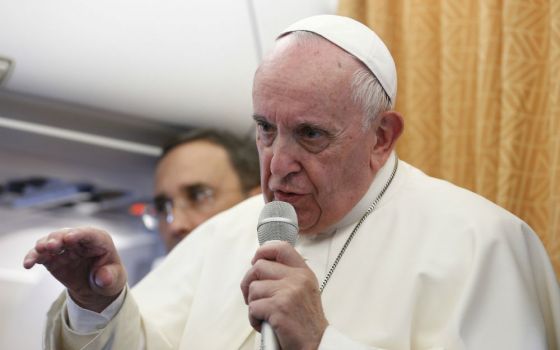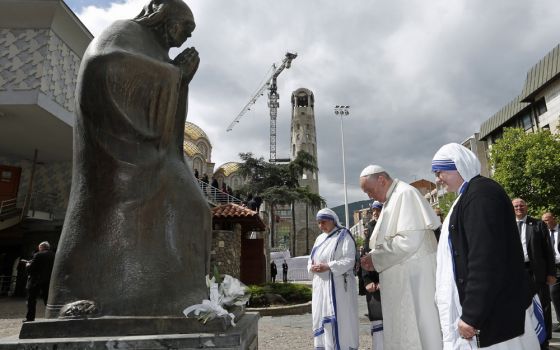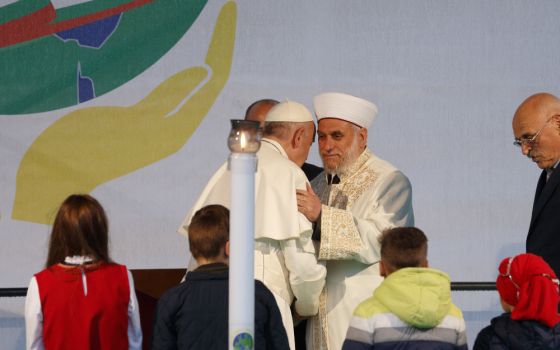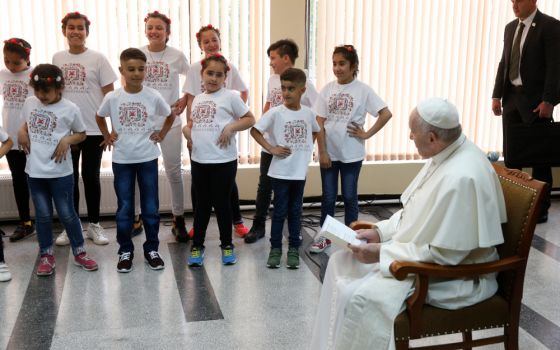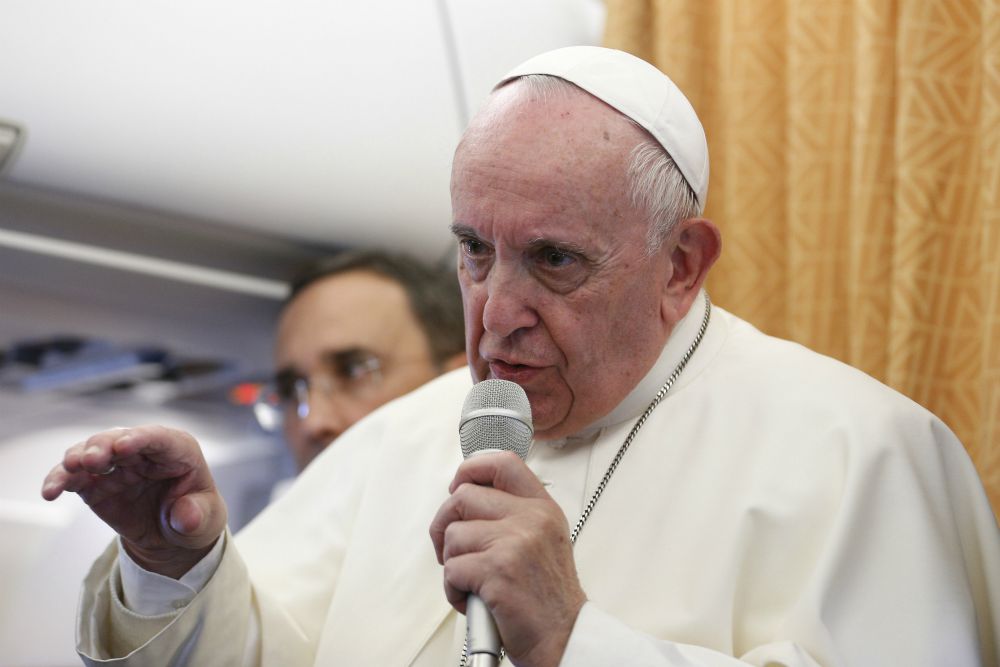
Pope Francis answers questions from journalists aboard his flight from Skopje, North Macedonia, to Rome May 7. (CNS/Paul Haring)
This story was updated at 3:45 p.m. CDT with information about other topics discussed during the press conference.
The Vatican commission studying the history of women serving as deacons in the Catholic Church has been unable to find consensus on their role in the early centuries of Christianity and is yet to give a "definitive response," Pope Francis said May 7.
In a press conference aboard the flight back to Rome after his three-day visit to Bulgaria and North Macedonia, the pope said the primary question is whether women who served as deacons were ordained in a manner similar to male deacons.
Each of the 12 members of the commission, said Francis, "thought differently."
"They worked together," the pope explained. "And they found agreement up to a certain point. But each one of them has their own vision, which doesn't accord with that of the others."
"They stopped there as a commission, and each one is studying and going ahead," he said.
Francis created the study commission in 2016, following a request from the umbrella group representing the world's Catholic sisters and nuns, known as the International Union of Superiors General. He had not spoken of the matter publicly since.
While the pontiff did not give his personal opinion on the role women deacons played in the first centuries of the Catholic Church, his remarks appear to effectively dash hopes the global institution will end its practice of having an all-male clergy soon.
Pope John Paul II wrote in his 1994 apostolic letter Ordinatio Sacerdotalis that "the Church has no authority whatsoever" to ordain woman as priests, citing Jesus' choosing of only men to serve as his 12 apostles.
Many church historians have said, however, that there is abundant evidence that women served as deacons in the early centuries of the church. The apostle Paul mentions such a woman, Phoebe, in his letter to the Romans.
Francis said May 7 that the main unresolved question was whether the ordination women deacons received was "sacramental" or not. He said historical documents evaluated by the commission giving the formulas for ordination of women deacons showed they "are not the same as for men's diaconal ordination."
"They looked more like those for what would today be the blessing of an abbess," he said.
"There were women deacons at the beginning," said Francis. "But was it a sacramental ordination, or not? It's what they are discussing and are not seeing clearly."
"It is fundamental that there is not certainty that it was an ordination with the same formula and the same finality of men's ordination," he said.
Francis was asked about women deacons by NCR on behalf of the English-speaking journalists on the papal flight.
The pope made clear that he does not consider the matter of understanding how women deacons served as closed.
"We arrived at a certain point," he said. "But now each member of the commission is studying, according to their own thesis. This is good."
Although Francis said the individual members of the commission continue to study, he did not indicate if the group itself continues to be active as a Vatican body. The commission has been led by Cardinal Luis Ladaria, the head of the Congregation for the Doctrine of the Faith, and has had six male and six female members.
The pope said their initial report "could serve as the launching point for going ahead and studying, and giving a definitive response as to yes or no, according to the characteristics of the era."
"I am not afraid of studies," Francis added.
The May 7 press conference lasted about a half-hour. The pope also gave highlights of his trip abroad, where he had focused particularly on the needs of refugees living in Bulgaria and North Macedonia and on relations between the Catholic Church and the various Eastern Orthodox churches.
Francis called Bulgarian Orthodox Patriarch Neophyte, whom he met with May 5, "a man of God." The pontiff said that each of the patriarchs he has met with during his six-year papacy has left an impression.
"In the patriarchs, I have found brothers," said the pope, mentioning Constantinople's Bartholomew and Moscow's Kirill by name. "I do not want to exaggerate, but I want to say the word 'holy' — men of God."
"We are brothers," said Francis. "We cannot adore the Holy Trinity without having the united hands of brothers. This is my conviction, and also of the patriarchs, all of them."
[Joshua J. McElwee is NCR Vatican correspondent. His email address is jmcelwee@ncronline.org. Follow him on Twitter: @joshjmac.]
Advertisement




